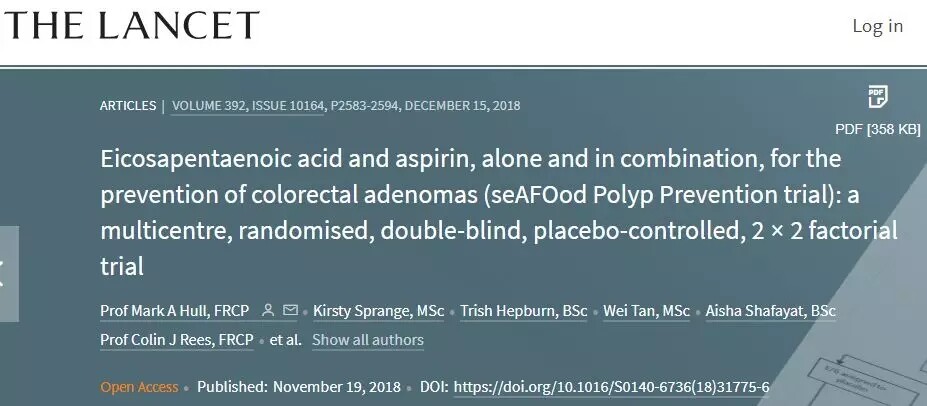In an article in The Lancet, scientists from the University of Leeds, the University of Nottingham, Bradford University and Newcastle University found that aspirin and EPA can reduce specific precancerous conditions in the intestines of people at high risk of colorectal cancer. The number of polyps!
There are many reports about aspirin. This "medicine" has many effects - in addition to the initial analgesic and anti-inflammatory, it has also been proven to have positive potential in anti-thrombosis and anti-cancer.
EPA is an abbreviation for Eicosapentaenoic acid , which belongs to omega-3 and is the main component of fish oil.
This effect is expected to bring additional preventive measures based on colorectal examination. “Considering that this combination is relatively inexpensive and safe, this research is surprising,” said Mark Hull, team leader and professor of molecular gastroenterology at the University of Leeds.
Scientists are trying to find effective ways to prevent it from other angles. In this study, scientists conducted a one-year seAFOod trial to determine the effects of commonly used drugs (aspirin, EPA) on reducing intestinal polyps.
The research team recruited more than 700 patients from 53 hospitals across the UK who were identified as high-risk colon cancer patients after colonoscopy with the BCSP.
Subjects were randomized into 4 groups, taken daily: 300 mg aspirin tablets; 2 g EPA (4 capsules); aspirin + EPA; placebo. One year later, although there was no difference in the proportion of colorectal cancer diagnosed in the four groups, scientists still found positive changes:
1) The number of intestinal adenomas in a group of patients taking aspirin was reduced by 22% compared to those taking placebo, including the right side of the large intestine (the furthest from the colon, the most difficult area for colonoscopy) );
2) The number of adenomas in patients taking EPA was reduced by 9% compared to those taking placebo. Although this difference is not statistically significant, this benefit is very significant in the left side of the intestine, and the number of adenomas is reduced by 25%;

“The seAFOod trial has demonstrated the preventive effect of aspirin and purified omega-3 to some extent,” Mark Hull said. “Given this new evidence, clinicians can consider the significance of this combination of drugs for patients with a higher risk of bowel cancer. ”
The results show that "aspirin + EPA" may be a precise way to prevent intestinal polyps. It should be noted that this study does not provide a definitive answer. The conclusions of the association between “aspirin and EPA combined therapy for preventing polyps” still require more research support.


